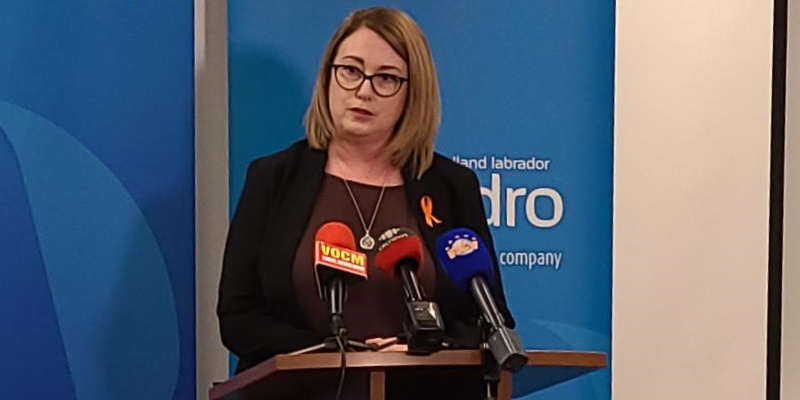Hydro CEO Jennifer Williams recently addressed Rotary with new evidence of industrial demand for electricity, especially in Labrador, raising the prospect of a new build in the “energy warehouse”.
She sees opportunity for a capital project on the Island, too; the retirement of the Holyrood Plant was invoked (where did we hear that before) and the option of constructing turbine #8 at Bay d’Espoir.
Williams was intentionally vague over the origins of the demand in Labrador though not a lot of imagination is needed to figure out that two kinds of mining are involved – iron ore and crypto, as in Bitcoin. Both industries are known to have large electricity requirements though, typically, they expect to pay little.
The issue of NL Hydro taking on large capital investments was less worrisome a decade ago, but not now. The debacle of Muskrat Falls is still fresh; the LIL still broken.
Ms. Williams’ failure to address where she found new expertise, not having gotten rid of failed people in the organization, telegraphs that she may also suffer from a “we know best” mindset.
Normal feedback mechanisms in politics ought to inspire the Premier, the Finance and Energy Ministers to pick up the phone (a text message for this job won’t do) to counsel senior bureaucrats, like Ms. Williams, when they exhibit deafness or immaturity in such matters. In this case, the politicians are no better equipped than she is to parse how the Government should deal with the Muskrat mess, except by pretending that all has been resolved.
I wonder if Ms. Williams understands that they will cut her off at the knees if her flat-footedness reflects on them.
Rotary is a non-political organization; it is one of the few that still recognizes the importance of public policy discussion to the function of government and society. Rotary offers opportunity for professional bureaucrats, like Jennifer Williams, to exhibit gravitas on the issues of the day and to “connect” with the very people they are serving.
If she thought that she had used her opportunity wisely, she should think again.
Williams could not be heard describing how Hydro has changed, if it is now more accountable, if its penchant for deception and falsification is corrected, and in what way she has influenced the Corporation’s capacity for transparency.
She could not even acknowledge what steps she has taken to ensure that the domestic rate payer will be insulated from a new round of excessive risk if any new capital project is approved.
Those failures might suggest that the still new CEO is less concerned about the ratepayer than she is about keeping surplus engineers on her staff preoccupied. Indeed, one might have thought the Consumer Affairs advocate to the PUB would send a blast across Ms. Williams’ bow on the subject, but he would have to clear that with the Premier first.
It is worth remembering Inquiry Commissioner Richard LeBlanc’s recommendation that independent review should be applied to capital projects worth over $50 million, though I suspect that offering sits under the same pile of dust afforded Moya Greene.

It is truly hard to find concern for the ratepayer in the connection – or is that dysfunction – between Confederation Building and NL Hydro. This example is illustrative.
Williams responded to a question from this scribe, as to whether Hydro was meeting GNL’s expectations on “rate mitigation”?
In 2019, Premier Ball budgeted a $20 million saving “through efficiencies and reducing duplication at Nalcor”. Ms. Williams informs that Hydro has not been asked by GNL to meet any financial target for rate mitigation purposes, stating that she has reduced her executive staff by 7 people and that, faced with new projects, further reductions are unlikely.
Her admission contrasts with the advice of the Liberty Consulting Group and the PUB looking at rate mitigation options. They suggested a merger of Nalcor/NL Hydro should eliminate 113 full-time jobs “many of them at Nalcor and Hydro’s higher compensation levels.” Letting go only 7 hardly qualifies as trying.
This may be less the fault of Ms. Williams than of the Finance Minister, Siobhan Coady. The Minister is already renowned for operating in a parallel universe; her Treasury is never at risk. But that does not explain Williams’ indifference to either the competencies or the values that have replaced a once fine Crown Corporation with the “Nalcor State”.
There is another concern.
Williams’ public policy and private sector experience is limited; her former employer, Newfoundland Power, is a “regulated” entity. As such, it is not exposed to competition. When profit is effectively “awarded” by the PUB, “risk” is not a word that gets much exercise. Construction outcomes especially suffer within the paradigm of OPM (other people’s money).
One might have hoped that her private-sector Chair and Board of Directors have been re-working Hydro’s copybook, giving her encouragement to return the Corporation to the noble state of financial prudence, once a hallmark of her predecessors before Ed Martin. As it stands, we’ll never know if anything has to be proven feasible before the blasting begins.
Even a commitment to competitive bids for the entire project from qualified contractors – this time – would be welcomed. And a commitment to keep Gilbert and Paul at bay!
Had Jennifer Williams said half as much, Rotary’s splendid repast might not have gone down in such a lump.
